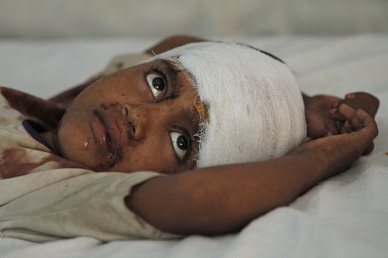Jakarta Globe
 Calls for “virginity tests” for high school girls emerge regularly in Indonesia, with education officials, politicians and religious leaders proposing tests every few years. Recent news that education officials in Prabumulih district in South Sumatra and Pamekasan in East Java are considering such tests caused an uproar. In 2010 officials from Jambi in central Sumatra proposed virginity tests for school girls to general outrage, but the idea died. Leading Indonesian rights activists and even some government officials have strongly criticized such calls, as did the National Commission on Violence Against Women (Komnas Perempuan).
Calls for “virginity tests” for high school girls emerge regularly in Indonesia, with education officials, politicians and religious leaders proposing tests every few years. Recent news that education officials in Prabumulih district in South Sumatra and Pamekasan in East Java are considering such tests caused an uproar. In 2010 officials from Jambi in central Sumatra proposed virginity tests for school girls to general outrage, but the idea died. Leading Indonesian rights activists and even some government officials have strongly criticized such calls, as did the National Commission on Violence Against Women (Komnas Perempuan).
So why does this dangerous and abusive practice keep returning, almost like a hydra with multiple heads that regenerate after they are cut off?
Dangerously poor information about female anatomy underlies calls for so-called virginity tests. The belief that all virgins will have intact hymens that will bleed on first intercourse is unscientific and inaccurate. Poor information has bred discriminatory traditions and practices, and violence against women not only in Indonesia but in many other societies around the world for centuries.
In India, many doctors who conduct medico-legal examinations of rape survivors note down the number of fingers that passed through the vagina, and use that to draw conclusions about whether a rape survivor is “habituated to sex.” Commonly known as the “two-finger test,” such observations have been condemned not only by women’s rights groups but also by some doctors and the Indian Ministry of Health and Family Welfare. In one rape case in India, two doctors conducted two separate gynecological exams, one suggested there was evidence of sexual assault and the other concluded that the victim was “habituated to sex,” exposing the ridiculously subjective and unscientific nature of the “finger test.”
The origin of such practices remains unclear, but it dates back to at least early 18th century. Wiping out misinformation inherited through centuries is an uphill task, but the tide in India is definitely turning. In March 2013, the Indian parliament introduced reforms to evidence law that disallowed any evidence about previous sexual experience, removing any scope for unscientific and degrading arguments based on a woman’s “habituation to sex” during rape trials. In April, the Indian Supreme Court condemned the two-finger test saying it violated women’s rights to privacy and dignity. The Indian government is modifying its medico-legal protocols for treatment and examination of rape survivors to eliminate scope for such degrading observations by doctors.
Ideas about a virgin’s “intact hymen” and the “bloody-sheet” theory — that is, branding women who do not bleed after having sex for the first time as “impure” and “dishonorable” — result in humiliation and violence against women in many societies and cultures, notably in the Middle East. These include husbands divorcing wives not considered virgins, brides’ families being punished through fines or being forced to return property received during the wedding, women committing suicide to escape the ignominy, and beatings and “honor” killings of “dishonorable” women. These practices violate the rights of women and girls to personal autonomy, integrity, dignity, and freedom from violence.
Increasingly, in desperate bids to avert violence after being subjected to “virginity tests,” women and girls have opted for hymen reconstruction, posing ethical dilemmas for doctors. Should doctors perform such procedures and perpetuate incorrect notions around virginity or should they do everything they can to keep a woman safe? Whatever the ethical dilemmas, surgical restoration of the hymen is beyond the reach of poor women and girls — for example, one Jakarta hospital suggested that it would cost Rp 17.5 million ($1,600) — leaving them to suffer unchecked humiliation and violence.
Virginity or its lack cannot be medically certified with accuracy. Doctors from Egypt and Saudi Arabia conducted a medical literature review in 2011-12 and concluded that it was impossible to say whether a woman or adolescent girl is a virgin through a gynecological exam. They reiterated that knowledge of the hymen anatomy and its abnormalities was essential to eliminate misconceptions about it.
Lining up adolescent girls in Indonesian schools and performing gynecological tests will have terrible consequences including the humiliation that is attached to the examination itself and any long-term psychological effects. A medical certificate alleging that a girl is “not a virgin” could mean violence and humiliation in the school, home or community.
Proponents of “virginity tests” in Indonesia have cited two concerns — commercial sexual exploitation of children and consensual sex by adolescent girls, as reasons to perform these “tests.” But stigmatizing children through “virginity tests” is harming — not helping — them. The government’s policies to protect children from sexual exploitation should promote the fundamental right to education by ensuring that girls remain in school rather than singling them out for traumatic and unnecessary “virginity tests.”
Consensual sex by adolescent girls is a legitimate reproductive and sexual health concern. Girls have a right to protect themselves from transmission of HIV, other sexually transmitted diseases and pregnancy. Yet again, a “virginity test” is not the solution.
The Indonesian health minister has called for age-appropriate sex education for not just school-going girls but also boys. Indonesia has successfully piloted voluntary sex education programs to raise awareness about the health risks around sex and the government should support such programs in schools. Appropriate information, not terrorizing girls through discriminatory and degrading “virginity tests,” is the best place to start.
link for this opinion:
Picture:








